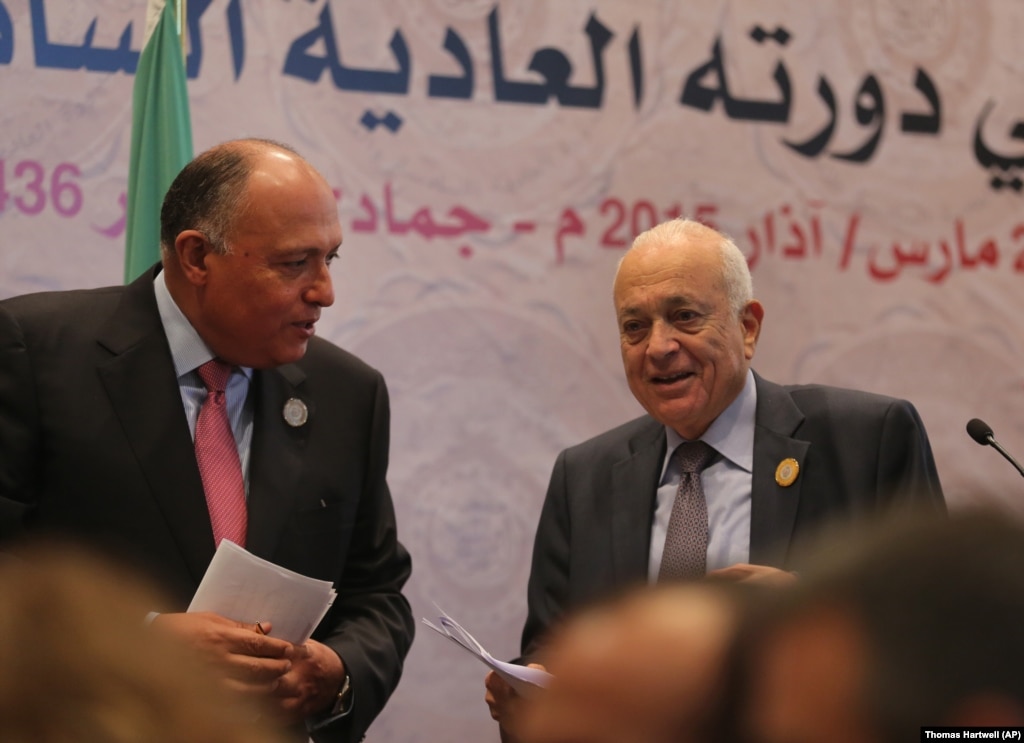
For months, members of the Arab League have been calling for a joint military force. The force would try to control the widespread violence in the region. At a recent meeting, members of the Arab League mostly agreed to form the force. But analysts say it may not be possible to create the force and prepare it to fight complex modern conflicts.
At the league's recent meeting in the Egyptian resort city of Sharm-el-Sheikh, Egyptian President Abdel-Fattah el-Sissi promised that military leaders would form a committee. The committee will try to work out how to assemble an Arab League military force.
He did not say exactly who will be in charge or where the force will go. It is thought the force might go to countries such as Libya, Yemen, Iraq and Syria.
Most Arab heads of states and foreign ministers now agree that they must form an international force of Arab fighters to secure the region. Yet, some Arab League representatives do not agree.
Sectarian divisions
Iraqi Foreign Minister Ibrahim al-Jaafari is against intervention. He believes it could make conflicts worse. Mr. al-Jaafari pointed out that people of many Arab countries are members of two main Muslim groups. The groups, Sunni and Shia, cause conflicts within the countries and between the countries. Sunni countries and groups generally support Saudi Arabia, and Shia countries and groups support Iran.
Complex tribal and political divisions add to the existing disorder. One regional newspaper said people do not usually put the three words “Unified, Arab, and force” together.
Abdullah al-Ashaal is a former deputy foreign minister and ambassador in Egypt. He said these religious and tribal divisions could make it impossible for the Arab world to form a military.
“Since when are the Arabs united on anything? If they are united at any moment, tell me," he said.
If the Arab countries did unite enough to form a military, al-Ashaal says these divisions could make the fighting worse.
For example, in Yemen, the Iranian-backed Houthis are fighting the Saudi-backed government. If an Arab force intervened in Yemen, al-Ashaal explained, it would be the same as starting a war with Iran.
“What [are they] going to do with the force? To do what? To fight Iran?" he asked. "They will smash them all. Iran is very strong militarily.”
But political analyst Hisham Kassem disagrees. He says international forces are badly needed to deal with the threat of the Islamic State militants. The United States, NATO and the United Nations are increasingly losing interest in sending troops to the Middle East. As a result, Mr. Kassem says, the Arab world has to take some action.
“It’s not an option. A force has to be created with some minimal support from the United States and Europe," he said. "Nobody at this point who is directly threatened can afford to say, ‘None of my business’ or ‘I don’t want my people killed.’”
In the U.S., response to the announcement was positive. On Monday, Defense Secretary Ash Carter called the planned joint force "a good thing."
State Department spokeswoman Marie Harf said the U.S. was waiting to see the exact structure of the joint force and what it is ordered to do.
Heather Murdock wrote this story for VOA News. Jill Robbins wrote it for VOA Learning English. Hai Do was the editor.
Words in This Story
analyst - n. a person who studies or analyzes something
complex – adj. of or having many parts that are difficult to understand; not simple
conflict – n. a fight; a battle, especially a long one
intervention – n. the act of becoming involved in something (such as a conflict) in order to have an influence on what happens
Now it’s your turn. What do you think of the plans to create an Arab military force? Write to us in the comments section.





